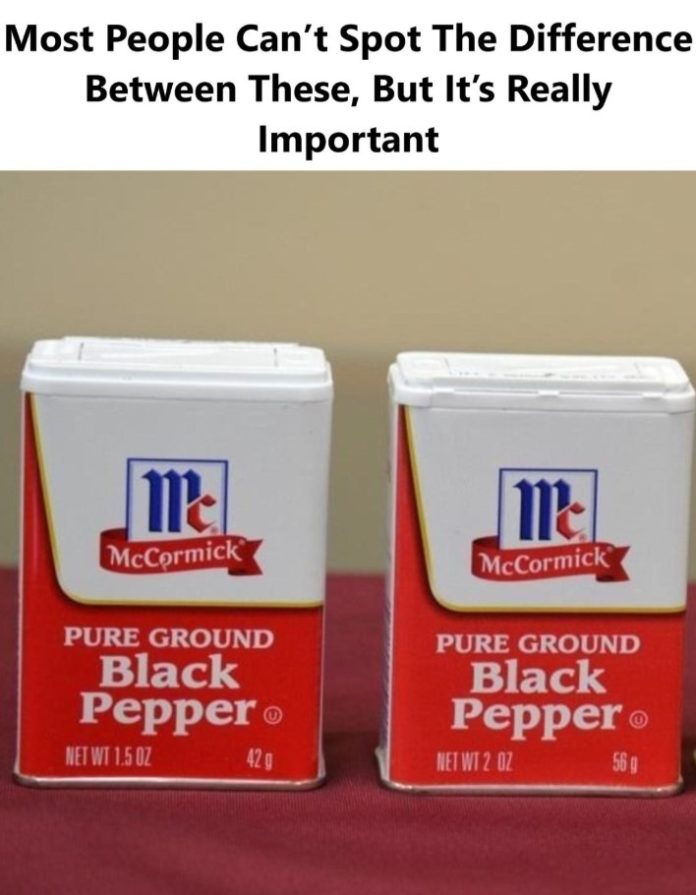In a world overflowing with choices, it’s easy to overlook the nuances of everyday products. But what if those details held the key to understanding deceptive practices that could impact our trust in major brands? One such case has come to light in the spice industry, where a clash between the renowned McCormick & Co.
and the challenger Watkins Inc. has raised questions about honesty, transparency, and consumer protection. At the center of this controversy is something as seemingly simple as ground pepper containers—but the implications are far-reaching.
An Incurable Pepper Tin Scandal
McCormick, a household name in spices, has recently faced accusations of deceptive practices concerning its ground pepper tins. According to Watkins Inc., McCormick has been quietly reducing the quantity of pepper in its containers by a staggering 25%, while maintaining the same packaging size. Previously, McCormick’s tins contained around 8 ounces of ground pepper. Now, however, these tins hold only 6 ounces—a significant decrease disguised by the unchanged appearance of the packaging.
Watkins, a competitor in the spice market, has sounded the alarm about this issue, claiming that McCormick’s opaque containers create an illusion of more pepper than they actually hold. This, Watkins argues, misleads consumers into believing they are getting a better deal. In contrast, Watkins has adopted transparent labeling and smaller containers that accurately reflect the product’s quantity. Watkins contends that McCormick’s actions violate consumer protection laws and undermine fair competition.
The Advertising Divide
This dispute has shone a light on the stark differences in marketing strategies employed by the two companies. McCormick relies on opaque containers that obscure the actual quantity of pepper inside, while Watkins takes a more straightforward approach with clear and honest labeling. According to Watkins, McCormick’s opaque packaging constitutes a deliberate attempt to mislead consumers. This, Watkins argues, is a textbook example of deceptive advertising.
McCormick, for its part, denies any wrongdoing. The company asserts that the weight of the product is clearly stated on the packaging and that consumers have all the information they need to make informed choices. However, this explanation has done little to assuage consumer frustration.
Effects on Consumers
The controversy surrounding McCormick’s pepper tins has significant implications for consumers. Many people, when comparing McCormick and Watkins products side by side, assume that McCormick offers a superior value simply because of the larger container size. Yet, the reality is quite different: the actual quantity of pepper is identical between the two brands.
Unhappy customers have not taken this issue lightly. Alongside Watkins’ allegations, a class-action lawsuit has been filed by dissatisfied consumers who purchased McCormick’s newer, smaller tins. These individuals claim they were misled into believing they were receiving more pepper than they actually did. The matter is now being handled in federal court, with significant ramifications for both McCormick and its customers.
This scandal highlights a critical lesson for consumers: appearances can be deceiving. It’s vital to scrutinize product labels and understand what you’re truly getting for your money. In this case, the fine print on McCormick’s tins was the only clue to the reduced quantity, leaving many shoppers feeling duped.
The Importance of Trust
Trust is a cornerstone of any successful brand, and McCormick’s actions have cast a shadow over its reputation. Transparency and honesty are not just ethical imperatives; they are essential for maintaining consumer confidence. When a brand’s integrity is called into question, the fallout can be long-lasting.
This situation serves as a wake-up call for all companies. Strong community ties and a reputation for trustworthiness are crucial for long-term success. Deceptive practices, even if technically legal, can erode the very foundation of a brand’s relationship with its customers. As McCormick faces mounting criticism and legal challenges, it’s clear that rebuilding trust will require more than just damage control—it will necessitate a genuine commitment to transparency.
Why the Details Matter
At first glance, the difference between McCormick and Watkins pepper tins might seem trivial. However, this case underscores the importance of paying attention to the finer details in everyday products. From food and spices to clothing and household goods, the way items are presented can greatly influence consumer perception. Honest advertising and clear labeling are not optional; they are fundamental to fair trade and consumer rights.
This dispute between McCormick and Watkins serves as a reminder to shoppers to be vigilant. Understanding what you’re buying and questioning discrepancies can protect you from falling victim to misleading tactics. As consumers, we have the power to demand better practices from the brands we support.
Conclusion
The pepper tin scandal involving McCormick and Watkins highlights a broader issue of transparency and accountability in the marketplace. While it may seem like a minor squabble over spices, this controversy has far-reaching implications for consumer trust and corporate ethics. McCormick’s reputation has taken a hit, while Watkins has positioned itself as a champion of honesty and fairness.
Ultimately, this case serves as a cautionary tale for both businesses and consumers. For companies, it’s a reminder that deceptive practices can damage credibility and alienate customers. For shoppers, it’s a call to be more discerning and to prioritize transparency when making purchasing decisions. By paying closer attention to the details, we can ensure that our choices align with our values and expectations. In a world where appearances can be deceiving, vigilance is the key to making informed and empowered decisions.










